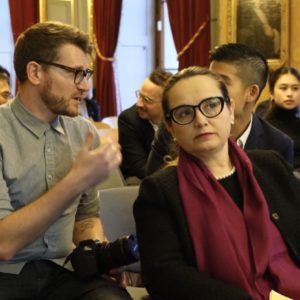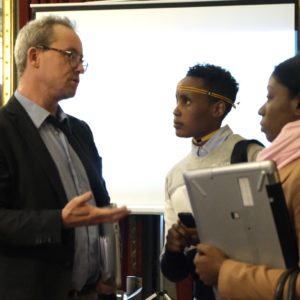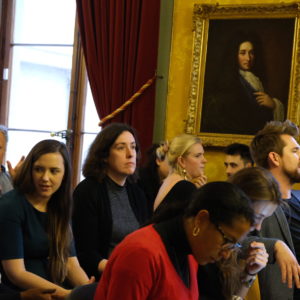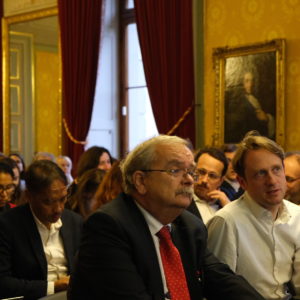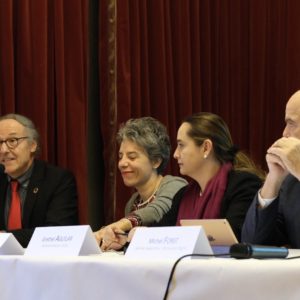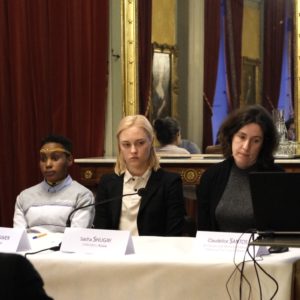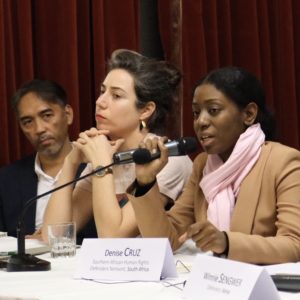Événement Conférence
Public Roundtable | Supporting environmental defenders: How can we mobilize the international community?

As a follow-up to the HRC Resolution 40/11, a Geneva Road Map seeking to ensure the effective implementation of the right to act for the protection of the environment and to promote free and safe spaces for information and discussion on environmental matters, is being launched by the University of Geneva and partners. It included a 2-day technical workshop, a public dialogue (26 February), and a side event at the Human Rights Council (27 February).
About this Session
As a global hub of international diplomacy, how can the international community in Geneva be mobilized to help protect environmental defenders and civic spaces?
This public event combined testimonies from environmental defenders with recent academic analysis and responses from high-level representatives from International Geneva and the Mayor of Geneva.
The event was organized in the context of the international conference “Towards a Geneva Road Map: Responding to the Needs of the Environmental Civil Society and Defenders”.
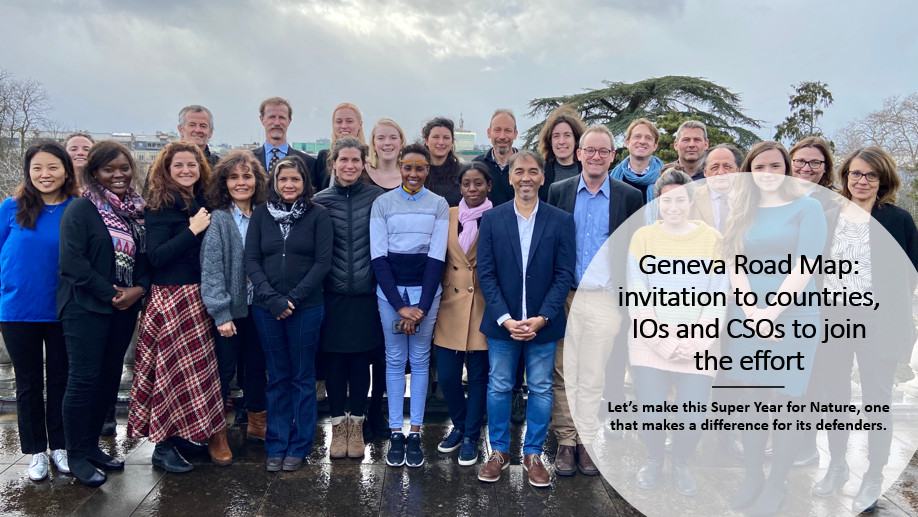
Environmental Human Rights Defenders Workshop at Palais Eynard, February 2020.
Organizers: University of Geneva – Gouvernance de l’environnement et du développement territorial – GEDT, City of Geneva, Earthjustice. With the support of: Geneva Environment Network, International Union for the Conservation of Nature, UN Environment Programme, UN Human Rights Special Procedures, Geneva Academy, Geneva Science-Policy Interface, The Geneva Human Rights Platform, Fondation Ernest Boninchi, University of Sussex, University of British Columbia.
Media contact: env-defender-event@unige.ch
Agenda
Opening remarks
Sandrine SALERNO, Mayor, City of Geneva
Yves FLÜCKIGER, Rector, University of Geneva
Grethel AGUILAR, Director General, IUCN
Michel FORST, UN Special Rapporteur on the situation of Human Rights Defenders
Dedication
Mary MANTON, University of Sussex
Environmental Human Rights Defenders
Claudelice SANTOS, Zé Claudio and Maria Foundation
Sasha SHUGAY, Fridays for Future
Winnie SENGWER, Defenders Coalition
Denise CRUZ, Centre for Democracy and Development
Selen CATALYUEKLI, Defender
Enteng BAUTISTA, Kalikasan People’s Network, Philippines
Institutional insights
Angela KARIUKI, Law Officer, UNEP
Cristina CAMBIAGHI, Senior Thematic Officer, International Land Coalition
Fran LAMBRICK, Not1More
Yves LADOR, Earthjustice
Summary
Opening remarks
Yves Flückiger, Rector, University of Geneva
- Link between academic research and policy concerns
- Activists and civil society are challenging decision-makers to think and act differently on climate change, biodiversity loss and pollution, but these peoples and organizations are challenged themselves
- Science is challenged by fake news and reject in the field of public policy
- We have no choice: we have to mobilize the international community to strengthen the defence of environmental defenders
Grethel Aguilar, Director General, IUCN
- Human Rights are non-negotiable and human lives are non-negotiable
- We need to amplify the message: people are dying for the wrong reasons
- IUCN knows that indigenous communities and environmental defenders are working for all of us, without nature we would not survive on this planet
- This is everybody’s job. We have some champions on the field and we need to join their voices in protecting the environment
- IUCN has been discussing on and supporting the protection of environmental defenders
- Motion on the protection of environmental defenders at the IUCN World Congress 2020
- Geneva Road Map is going to be a success, it has a very passionate message as a background
- Environmental defenders are essential in achieving the SDGs, because their rights are our rights, their planet is our planet
- Call for measures to protect environmental defenders at risk
- This is about people that put themselves at risk to protect natural resources that we depend on
- Need to apply the rule of law in an effective form
- IUCN is firm in amplifying the voice of environmental defenders
Michel Forst, UN Special Rapporteur on the situation of human rights defenders
- Soon publishing the country report on Colombia
- Meeting with government, NGOs as well as isolated and indigenous communities
- People became defenders because they were targeted, through harassment campaigns, stigmatization, threats and killings
- Targeted killings of defenders instead of random killings: objective is to instil fear in the whole defenders’ community
- Country report on Peru: same type of encounters and same type of situations
- Testimonies often mention the imbalance of power between governments, companies and defenders
- Exclusion from decision-making of affected communities: lack of prior informed consent
- Opposition to commodity-based growth, support for a rights-based approach, focusing on the rights of communities to healthy and sustainable environment
- Corruption and impunity when crimes are committed, masterminds never prosecuted
- Landmark UN resolution calling states to protect environmental defenders and prevent risks towards them
- NGOs initiatives helping environmental defenders
- Time for action
- Geneva Road Map – contributions from different stakeholders – recommended to:
- Effective protection of defenders starts with the full recognition by all stakeholders that everyone has the right to defend human rights and the environment
- Consult and include defenders and communities in decision-making processes
- Discussion on the role of finance institutions: their activities should not contribute to the violation of human rights and environmental rights
- Development of networks supporting individuals in need of support
- Empowering defenders in not only crucial for the protection of the environment and human rights, but also to make sure that our development be less conflictual and more inclusive
Dedication
Mary Manton, University of Sussex
- Indigenous leader and environmental defender Yehry Rivera was killed on Monday, 24 February 2020, due to land conflicts in his home region in Costa Rica
- Let’s not have a minute of silence, because sometimes silence is what is killing people, so let’s move on and act
Environmental Human Rights Defenders
Claudelice Santos, Zé Claudio and Maria Foundation
- All those people who have been killed need justice and they can find justice only through our actions, which is why we need to be united in requesting justice for them
- Until 2011, our struggle was local: we were fighting for infrastructure, territory and dignity
- In 2011, greed for money and for resources took the lives of my brother, Zé Claudio, and of my sister-in-law, Maria.
- From then onwards, our fight became much bigger
- The State of Parà is one of the most violent areas of Brazil
- The killings of Zé Claudio and Maria were not the first ones: many people were killed before them and many people were killed after them
- It was never easy for environmental defenders in Brazil, but in recent year have been extremely cruel
- The Bolsonaro government has a horrible plan to kill the people and the rainforest
- Hate speech and violence against environmental defenders has become part of Brazilian politics
- The world needs to take urgent action to support people at the grassroots, to think about collective effort and not in terms of individuals
- When we defend our rainforest, we protect our dignity and the dignity of future generations
- International Community should campaign in favour of sustainable consumption (beef, minerals, grains, …)
- I have hope that the world will unite to save lives and the existence of nature
- The creation of the UN showed once how the nations of the world united to stop violence, it is time to repeat that action to protect the environment
Sasha Shugay, Fridays for Future
- I started to become an activist in 2019, after hearing stories from Brazil and South America
- Joined Fridays for Future in native city of Novosibirsk
- Russia is digging up a lot of fossils fuels and gas
- Not a lot of civil space in Russia where to defend our rights
- Little legal protection for civil society to protest and protect environmental rights
- Minors cannot participate in protests
- Police, schools and municipalities often put obstacles to protests
- Police brutality also a problem for those who protest
- Freedom of speech is limited: fear of criticizing the government and to rally for climate justice
Winnie Sengwer, Defenders Coalition
- Sengwer is the name of the indigenous community I belong to in Southern Kenya
- Sengwers are hunter-gatherers living in the forest
- The forest that was our ancestral home was designated as a national monument and the community was evicted from the forest, with no plans for relocations in place
- Loss of culture and of traditions, assimilation by other cultures
- Violence and tensions are increasing because of land conflicts
- Need for land rights and justice – community is engaged in conservation of the forest through beekeeping, hunting and gathering
- Last year [2019], my community walked for 450 kilometers to have a dialogue with the Kenyan government, which has not offered dialogue options
- International Community should facilitate dialogue between government and community
Denise Cruz, Centre for Democracy and Development
- Mozambique is rich in natural resources, fauna and flora
- Natural resources have become a curse
- Recently, oil and gas reserves were discovered in the country. Foreign investments entered the country to exploit the reserves, but communities living on those lands were relocated without receiving compensation
- Foreign investors come in and do as they please
- The government must be held accountable in terms of the consequences of foreign investments exploitation of natural resources
- The Rovuma Basin has one of the highest presence of international oil and gas exploiters, but the region is plagued by terrorism and violence
- Governmental scandal recently involved an illegal debt by the government with Crédit Suisse, for which the government has not been held accountable
- Environmental and human rights defenders are intimidated and killed
- Recently, an activist working for free and fair elections has been murdered in Mozambique
- International Community has power: discuss trade deals as well as the protection of human rights in the country
- Take action! Sitting here and discussing things without being able to take meaningful action is a waste of time, energy and resources
Selen Catalyuekli, Turkish Environmental Defender
- What I am going to say has changed after the speeches of the other defenders.
- You have to find power in your own soul, in your own body, in your own community.
- We win anyway, because we are so right. How can we make humor out of it?
- Friends were trialed for creating a non-violent terrorist organization
- The situation was especially harsh in 2016
- It seems that nothing is working after a while at the very last moments in terms of international community pressure.
- How do you find the strength to go on when you see people die or get injured for fighting for their human and environmental rights?
- Slow death because of unhealthy environment is also an issue that is curtailing environmental defenders
Enteng Bautista, Kalikasan People’s Network, Philippines
- My colleagues, climate activists, recently were arrested on trumped-up charges of terrorism
- They were fighting for justice following Typhoon Haiyan
- Brandon Lee, a Chinese-American, a climate activist in the Philippines was shot in front of his house, critically wounded and paralyzed
- Glad that the Human Rights situation in the Philippines is being monitored by the Human Rights Council
- Need for more engagement of the International Community in terms of monitoring the HR situation in the Philippines and elsewhere
- Right for people to live in a clean, healthy and safe environment
Closing
Angela Kariuki, UNEP
- UNEP realized that it needed to do more
- Develop a policy on how to respond to the situation of environmental defenders:
- Speaking out – response mechanism and key messages
- Capacity-building – extend partnerships and legal work
- Policy – building, connecting and strengthening partnerships
- Where our mandate runs short, we rely on partners and civil society
Cristina Cambiaghi, International Land Coalition
- Some people fighting for the environment, their environment, sometimes do not know they are environmental defenders
- A lot of actors, that suffer from the thigs we heard today, do not know that they are protected by the International Community
Fran Lambrick, Not1More
- In dialoguing with each other, we manage to create hope, to unite
- The hope you get from each other is important
- My organization aims at making sure that defenders participate in these kind of negotiations
Yves Lador, Earthjustice
- Trend is that repression is stronger and harder and the dissemination of repression techniques is quicker and wider
- Small number of universities and researchers are looking into environmental defenders
- Still blind spots, information gaps
- 4 types of issues:
- Attacks against environmental defenders are increasing at a time when the protection of the environment is becoming increasingly central
- Shrinking space of civil society and the defense of environmental rights
- How to bridge the action between human rights and environmental activists
- How to break the isolation of protection mechanisms and foster connectivity between activists
- Geneva Road Map is an evolutive tool – developing cumulatively in a cross-sectorial manner
- International civil servant accused in Iran of spying just for doing her job at the UN – need to address the issue effectively
- Recognition of a right to a healthy and sustainable environment
Documents
Video
The event was live on Facebook.
Photos
Photos © UNEP/GEN, Malou Lenoir.
Links
- University of Geneva: Workshop & Public Roundtable – Supporting Environmental Defenders
- ICCA Consortium supports the global movement for indigenous peoples’ & local communities’ collective territories of life (ICCAs). These are under increasing threat, as are their custodians. The Consortium is attempting to respond via several initiatives.
- International Land Coalition: a global alliance of civil society & intergovernmental organisations working together to realise land governance for & with people at country level, responding to needs & protecting rights of those who live on & from the land.
- In 2018, UNEP launched the Promoting Greater Protection for Environmental Defenders Policy.
- In 2018, UNEP also launched the Environmental Rights Initiative, aiming at bringing environmental protection nearer to the people by assisting state and non-state actors to Promote, Protect and Respect Environmental Rights.
- Environment-rights.org is a collaborative resource portal for environmental human rights defenders. It is designed as a ‘living’ platform, constantly updated and expanded.
- Not1More (N1M) is an environmental campaign group founded in 2016 that supports frontline environmental defenders and investigates the root causes of environmental conflict.
- The Zero Tolerance Initiative, launched in 2019, seeks to address violence, intimidation & killings of indigenous people & other human rights defenders in global supply chains

